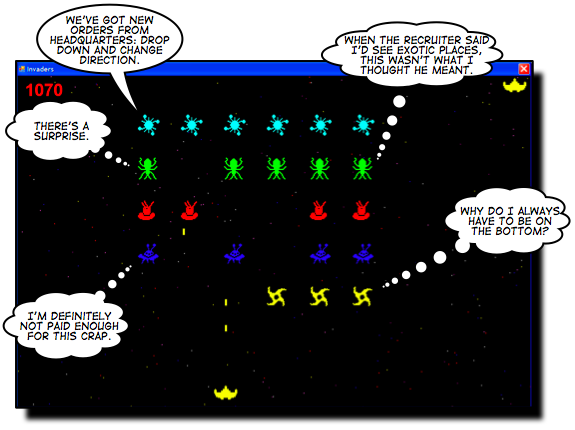
One of my favorite things about Head First C# is that Jenny and I ask our readers to do a whole lot of coding. When we started doing research for the book, one thing that really struck me about other books to help you learn C# was that I couldn’t find any book that actually asked its readers to write much code. There were one or two that we saw which had some written Exercises. And that’s great for a textbook, but I don’t know any programmer who learned to program with a pencil and paper. If you want to be a good programmer, you need to write a lot of code. Coding is a skill, and like any other skill it takes practice. And there are a lot of concepts that just don’t “click” until you write software that uses them.
I know that when I need to learn a new language, the first thing I do is come up with a project for myself. Like when I needed to learn Perl back in 1994 or so. I also wanted to learn about how web servers worked (they were newfangled and mysterious at the time), so I wrote a simple web server in Perl. (It turns out that it only takes about 50 lines of Perl to write a very simple HTTP/0.9 web server… probably a lot fewer, if you’re an insane Perl optimizng type.) So we decided from the beginning to make sure Head First C# has plenty of opportunities for our readers to write code. Which meant coming up with projects… a lot of projects.
Which turned out to be harder than it sounds. The instructions for the project needed to be completely self-explanatory. It’s not like an Agile project, where the programmer can talk to the customers and the software can go through several iterations. No, every project needed a complete specification, one that the reader could understand completely and build exactly the software we asked for.
And that’s where video games came in really handy.
When you ask someone to write, say, a business application, you need to explain all of the details of the business. And you need to explain why the program is needed, especially if the programmer doesn’t really have any background in that business. If a programmer doesn’t understand the reason or rationale for a particular feature, then it’s almost certain that he’ll build something other than what you’re asking for. (That’s why I always like including a rationale section when I write use cases. It prevents a lot of problems later in the project.)
Video games come “pre-loaded” with their own rationale. Nobody ever needs to ask why you’d write a video game — you do it because they’re fun. Everyone already knows why you’re writing it. It’s not hard to make a video game intuitive. One easy way to do it is to model it after a game that already exists. We have one Exercise where the reader builds a Go Fish! game, where the player plays against two computer opponents. One project is Hide and Seek — the player searches through a virtual house to find an opponent who hid in a random place. We’ve got a dungeon game, a Whack-a-Mole game, and my personal favorite (and the final project in the book), Space Invaders.
There are plenty of other sorts of projects, too. Our goal was to get the readers coding from the very beginning, and keep them writing code through the whole thing. We designed the projects to be satisfying and fun. And we’ve already gotten feedback from readers who definitely enjoyed them.
Head First C# Labs — The Contest
We’re running a little contest for our readers. We’ve included three labs in the book where the readers build larger projects. We give them a lot of design, but we don’t actually give them the code for the solutions (like we do for all of the smaller projects). Eventually, we want to post executables for the labs. But we don’t want to post our own — we want to post executables that our readers came up with! So we’re running a contest to see which readers can send in executables first. The first person to send us working code for the lab will have their executable posted on the website as the official solution, and we’ll send them some sweet O’Reilly swag, too. Here’s the contest page — we’re looking forward to seeing what our readers come up with!
